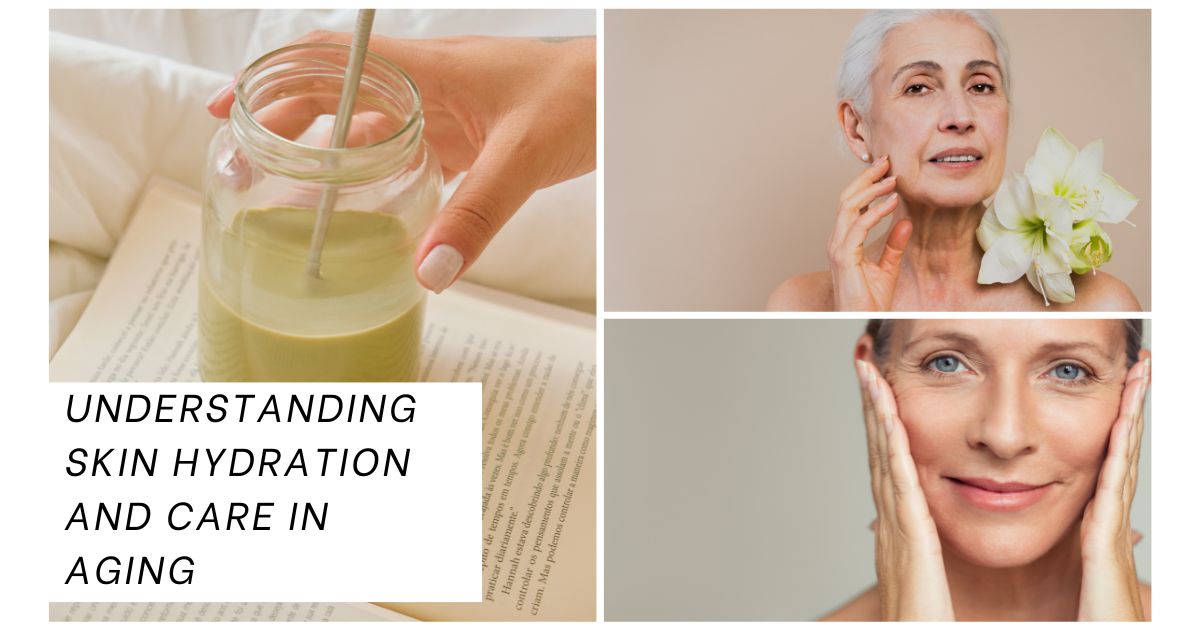Skin Hydration and Care stand as pillars of a healthy aging process, essential in maintaining the skin’s vitality, elasticity, and youthful glow. As we age, our skin undergoes various changes, becoming more susceptible to dryness, thinning, and the appearance of fine lines and wrinkles. Incorporating effective hydration strategies and meticulous skin care can significantly influence how gracefully our skin ages, supporting its health and resilience.
The Science of Skin Hydration
Hydration is the cornerstone of luminous, vibrant skin. Well-hydrated skin appears more plump, elastic, and smooth. Understanding the science behind skin hydration can empower us to make informed choices in our daily skin care routines. At its core, hydration refers to the water content within the skin, essential for maintaining its functions and structural integrity.
Skin hydration influences texture, tone, and overall health. Dehydrated skin can look dull, tired, and older than it actually is. Unlike dehydrated skin, which lacks water, dry skin may not produce enough sebum. Yet, both conditions can benefit immensely from proper hydration strategies, enhancing the skin’s natural barrier and minimizing signs of aging.
Key Ingredients for Hydrated, Healthy Skin
In the realm of skin care, certain ingredients are celebrated for their hydrating powers. These ingredients, categorized as humectants, emollients, and occlusives, work synergistically to maintain the skin’s moisture balance.
Humectants like hyaluronic acid and glycerin are hydration heroes, drawing moisture to the skin’s surface and holding it there. By attracting water, these substances help the outer layer of the skin remain supple and hydrated, a critical factor in keeping the skin looking youthful and radiant.
Emollients, including squalane, ceramides, and fatty acids, play a pivotal role in smoothing and softening the skin. They fortify the skin’s barrier, improving texture and appearance while helping to seal in moisture, ensuring the skin remains elastic and less prone to aging signs.
Occlusives, such as petrolatum, beeswax, and mineral oil, create a protective layer on the skin’s surface. This barrier helps to lock in moisture and prevent water loss, especially crucial in harsh weather conditions or for aging skin, which may struggle to retain hydration.
Moreover, the consistent use of sunscreen emerges as a non-negotiable aspect of skin care, particularly in preventing moisture loss. Sun exposure can significantly impair the skin’s ability to maintain hydration, accelerating aging signs. Broad-spectrum sunscreens containing zinc oxide or titanium dioxide offer dual benefits, protecting from harmful UV rays and aiding in moisture retention.
The Synergy of Hydration and Sun Protection
Sun protection is not merely about preventing sunburn; it’s a vital strategy for maintaining skin hydration and health. UV radiation can break down collagen and elastin, key proteins that keep skin firm and elastic. By incorporating sunscreen into your daily routine, you not only shield your skin from potential damage but also support its hydration levels, fostering a healthier, more resilient complexion.
Transitioning to Night: Maximizing Hydration
Nighttime offers a unique opportunity to enhance skin hydration. Transitioning to a heavier moisturizer in the evening can provide profound benefits, as skin naturally repairs itself during sleep. Ingredients like ceramides and hyaluronic acid in night creams can deeply nourish the skin, locking in moisture and supporting the skin’s natural regeneration processes.
Practical Guide to Hydrated Skin
Achieving and maintaining hydrated skin is a cornerstone of healthy aging. This section delves into daily routines, dietary habits, and common pitfalls to avoid, ensuring your skin remains vibrant and nourished.
Daily Skin Care Routine for Optimal Hydration
Morning Routine:
- Cleanse Gently: Start with a mild, fragrance-free cleanser to remove overnight build-up without stripping the skin’s natural oils.
- Apply Hydrating Serum: Look for serums with hyaluronic acid or glycerin to bind moisture to your skin.
- Moisturize: Use a moisturizer rich in emollients like ceramides or squalene to reinforce your skin’s moisture barrier.
- Sun Protection: Always finish with a broad-spectrum sunscreen to prevent UV-induced moisture loss.
Night Routine:
- Remove Makeup and Cleanse: Ensure all makeup and daily grime are thoroughly washed away.
- Use a Heavier Moisturizer: Nighttime is ideal for a more intensive moisturizer to work in tandem with your skin’s natural repair processes.
- Consider a Hydrating Mask: Once or twice a week, a hydrating sleeping mask can boost moisture levels.
Diet and Hydration: What to Eat for Healthy Skin
- Omega-3 and Omega-6 Fatty Acids: Essential for strengthening the skin’s moisture barrier. Find them in fish, nuts, and seeds.
- Zinc: Supports skin repair and collagen production. Enjoy zinc-rich foods like shellfish, meats, and legumes.
- Hydration: Drink plenty of water throughout the day and incorporate water-rich fruits and vegetables into your diet.
Common Mistakes and How to Avoid Them
- Over-Exfoliating: Limit exfoliation to once or twice a week to prevent barrier damage.
- Neglecting Sleep: Quality sleep is crucial for skin hydration and repair. Aim for 7-9 hours nightly.
- Ignoring Ingredients: Be mindful of the ingredients in your skincare products. Avoid harsh chemicals that can strip moisture.
FAQs: Hydration and Skin Care
- How often should I moisturize if I have dry skin?
- Moisturize twice daily after cleansing. If your skin feels particularly parched, consider using a hydrating booster or serum.
- Can drinking water improve my skin’s hydration?
- Absolutely! Internal hydration is key for maintaining skin’s moisture. Aim for at least 8 glasses a day and eat water-rich foods.
- What’s the difference between dry and dehydrated skin?
- Dry skin lacks oil, while dehydrated skin lacks water. Both conditions require different care strategies.
- Is it possible to overhydrate my skin with topical products?
- Overusing heavy creams can clog pores and cause breakouts, especially for oily skin types. Balance is crucial.
- Can certain foods dehydrate my skin?
- Yes, high-sodium foods, alcohol, and caffeine can contribute to dehydration. Moderation is key.
- How does sun exposure affect skin hydration?
- UV rays can damage the skin barrier, leading to moisture loss. Always use a broad-spectrum sunscreen.
